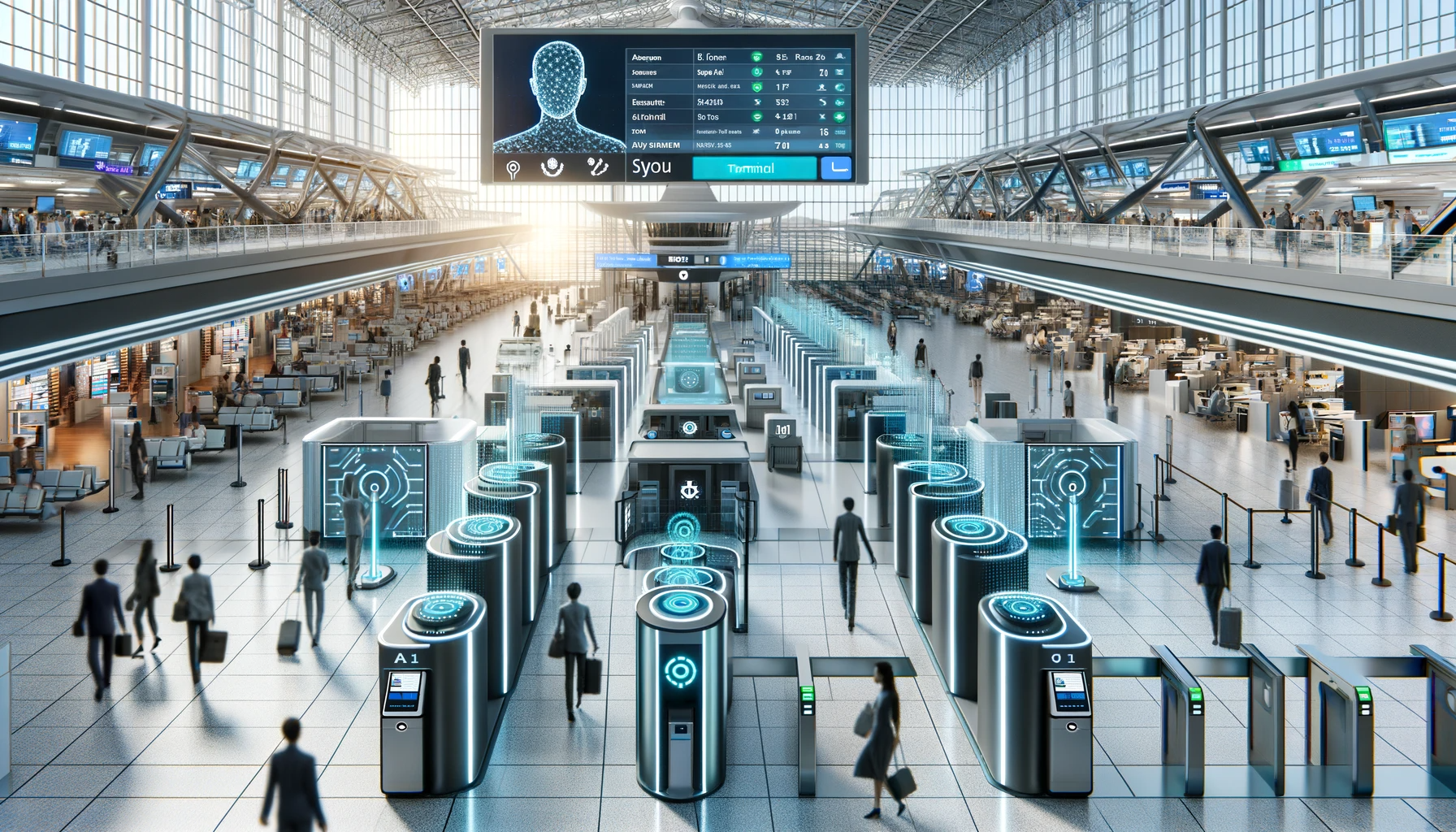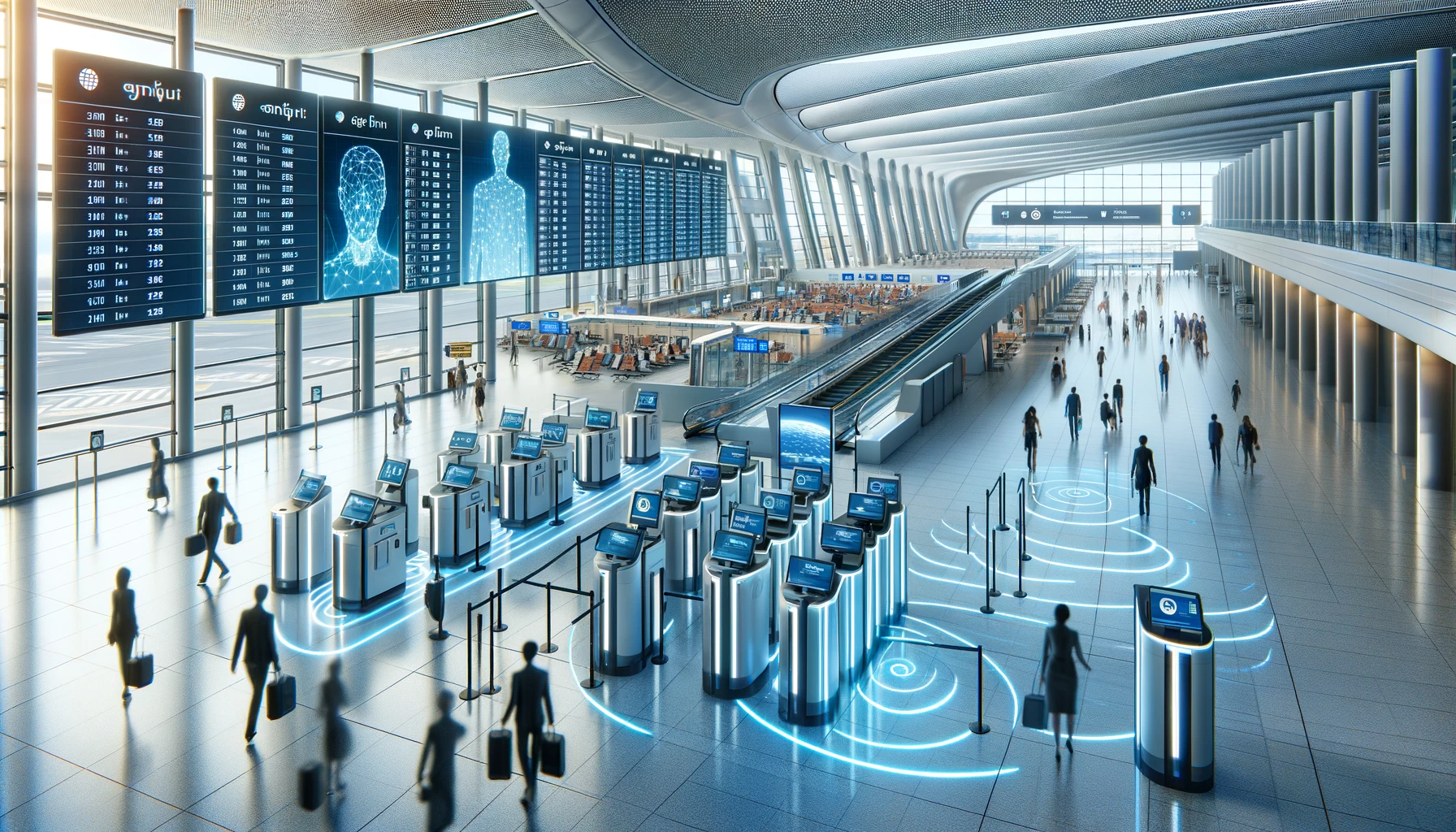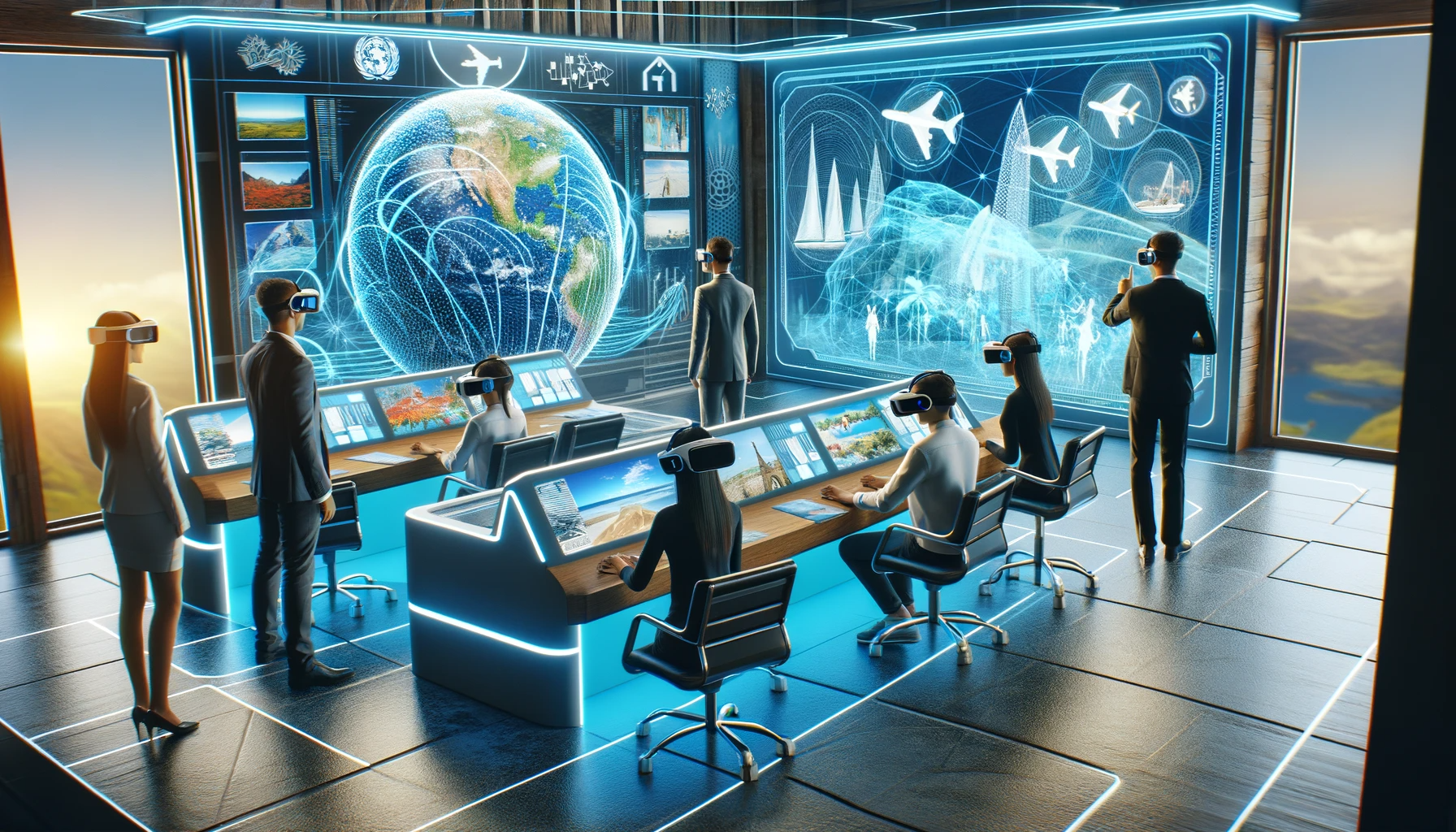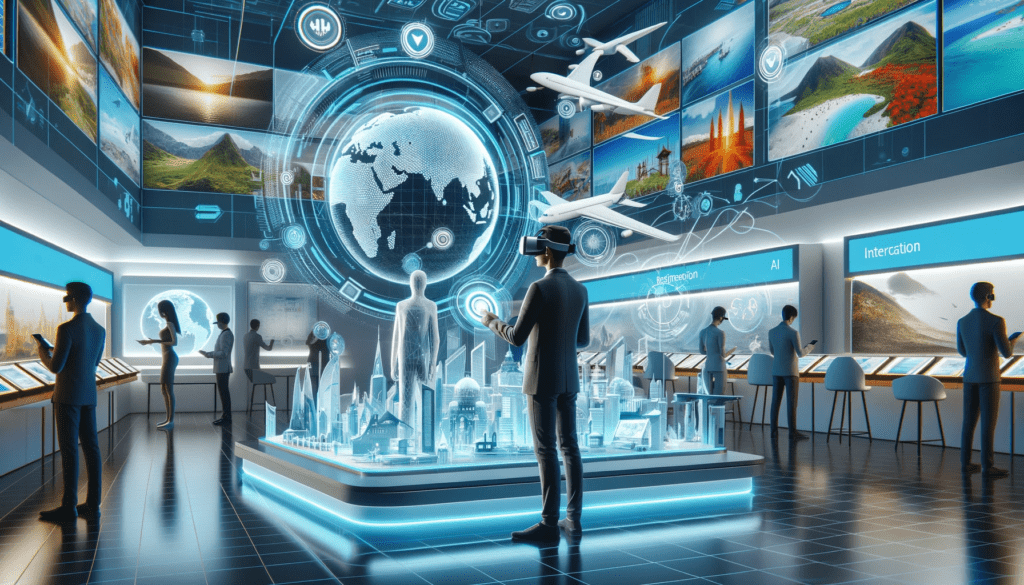The AI Revolution in Travel and Tourism
Picture this: You’re planning a vacation to a destination you’ve only dreamed of visiting. As you ponder over your options, a virtual assistant pops up on your screen, suggesting personalized itineraries based on your interests, budget, and travel history. With a few clicks, you’ve booked your flights at the most opportune moment when prices are at their lowest. During your journey, facial recognition technology smoothly guides you through airport security, making the process seamless and secure. As you explore your destination, augmented reality glasses enhance your experience, providing historical and cultural information in real-time, adding a layer of depth to your journey.
What makes this scenario not just a flight of fancy but an increasingly common reality is Artificial Intelligence (AI). AI, once relegated to the realms of science fiction, is now reshaping the landscape of the travel and tourism industry. It is a silent force, working behind the scenes to enhance every aspect of our travel experiences, from booking and planning to in-flight services and safety measures. In this 2000-word exploration, we will delve deep into the transformative power of AI in travel and tourism, analyzing its current applications, its impact on customer experiences, and its potential to redefine the industry’s future.
Understanding AI in Travel
Artificial Intelligence (AI) is not just a buzzword; it’s a technological paradigm shift that is redefining the travel and tourism industry. To comprehend the full scope of AI’s impact, we must first understand what AI is and its historical evolution in the context of travel.
Definition of AI
At its core, AI refers to the development of computer systems capable of performing tasks that typically require human intelligence. These tasks include learning from experience, recognizing patterns, making decisions, and problem-solving. AI encompasses various technologies, including machine learning, natural language processing, computer vision, and more. In the travel sector, AI is harnessed to create intelligent systems that can automate and enhance numerous processes.
Brief History of AI in Travel
The integration of AI into travel is not a recent development. The roots of AI in the industry can be traced back to the early days of computer reservation systems (CRS), which automated airline reservations. Over the decades, AI has evolved from simple rule-based systems to sophisticated machine learning algorithms capable of analyzing vast amounts of data. The result is an industry that’s becoming more efficient, personalized, and responsive to the needs of travelers.
Current Applications of AI in Travel
Today, AI’s presence in the travel sector is pervasive. From the moment you contemplate a journey to the time you return home, AI plays a role at every step:
- Customer Service Chatbots: Airlines, hotels, and travel agencies employ AI-driven chatbots to provide instant responses to customer inquiries, streamline booking processes, and assist with common requests.
- Recommendation Engines: AI algorithms analyze your past travel behavior and preferences to suggest personalized destinations, accommodations, and activities, making trip planning more intuitive.
- Dynamic Pricing: Airlines and hotels use AI to adjust pricing in real-time based on demand, optimizing revenue while potentially saving travelers money.
- Flight and Hotel Booking: AI-powered search engines and booking platforms help travelers find the best deals, combining convenience with cost-effectiveness.
- Itinerary Planning: AI systems can create detailed travel itineraries, including booking flights, accommodations, and even suggesting local experiences and restaurants.
- Translation and Language Support: Language barriers are no longer a hindrance, as AI-driven translation apps and devices facilitate communication in foreign countries.

The Impact of AI on Customer Experience
AI is not just about automation; it’s about enhancing the overall travel experience for individuals. This section explores how AI is transforming the way travelers interact with the industry, from personalized recommendations to immersive technology.
Personalized Recommendations
One of the most notable ways AI is reshaping travel is through personalized recommendations. Traditional travel agencies could never provide the level of personalization that AI-powered systems offer today. These systems consider your past travel history, preferences, and even factors like weather and events in your destination to curate tailored travel options. This personal touch allows travelers to discover new destinations and experiences they might have overlooked otherwise.
Chatbots and Virtual Assistants
AI-driven chatbots and virtual assistants have become indispensable in the travel sector. Whether you’re looking to change your flight, inquire about baggage policies, or request local recommendations, these chatbots are available 24/7, providing quick and accurate responses. They not only save time but also reduce human errors in customer service interactions, leading to more satisfied travelers.
Augmented Reality (AR) and Virtual Reality (VR)
Imagine being able to virtually explore your destination before even arriving. AR and VR technologies are making this possible. AR glasses and VR headsets can provide travelers with immersive experiences, from virtual tours of landmarks to previews of hotel rooms. These technologies add a layer of excitement and anticipation to travel, allowing travelers to engage with their destination in ways previously unimaginable.
AI in Safety and Security
While AI greatly enhances the convenience and efficiency of travel, it also plays a crucial role in ensuring the safety and security of travelers.
Enhanced Security Measures
Airports and hotels are increasingly utilizing AI-powered security systems to enhance safety. Facial recognition technology is becoming a standard feature at airports, streamlining the check-in process and improving security. Hotels use AI to monitor surveillance cameras, detect unusual behavior, and respond promptly to potential security threats.
In the age of AI, travelers can navigate airports and hotels with greater confidence, knowing that advanced technology is working tirelessly to protect them. Whether it’s identifying potential threats or ensuring a smooth and secure check-in process, AI contributes to an overall sense of safety and peace of mind.
Facial Recognition and Biometrics
Facial recognition and biometric authentication have revolutionized identity verification processes at airports and hotels. Travelers can now pass through security checkpoints and check into their accommodations with a simple scan of their face or fingerprint. This not only speeds up procedures but also reduces the risk of identity fraud.
The elimination of physical documents and the reliance on biometrics make the travel experience more convenient and secure. Travelers no longer need to worry about lost passports or identity theft, thanks to the accuracy and reliability of AI-powered biometric systems.
Emergency Response Systems
AI is also instrumental in emergency response systems during travel. Whether it’s an unexpected medical issue or a natural disaster, AI algorithms can analyze data and coordinate responses rapidly. This technology can save lives and minimize the impact of unforeseen events on travelers.
In times of crisis, AI can provide real-time updates and evacuation plans, ensuring that travelers are well-informed and safe. These emergency response systems are a testament to how AI can turn potentially chaotic situations into organized and well-managed events.
Sustainable Tourism and AI

Sustainability is a growing concern in the travel and tourism industry, and AI has a pivotal role to play in making tourism more environmentally responsible.
Environmental Impact
The carbon footprint of travel is a concern, but AI can help mitigate it. AI algorithms can optimize flight routes to reduce fuel consumption, recommend eco-friendly accommodations, and even suggest low-impact travel options such as public transportation or carpooling.
AI-driven sustainability initiatives not only benefit the environment but also appeal to environmentally conscious travelers. Sustainable travel is becoming a major selling point for destinations and businesses, and AI is helping to make these efforts more effective and visible.
Resource Optimization
AI-driven systems can contribute to resource conservation in the industry. Smart energy management in hotels, for example, can reduce energy wastage, and AI can optimize food and water consumption in restaurants and resorts. These initiatives not only benefit the environment but also lower operational costs.
Resource optimization through AI not only reduces expenses for businesses but also promotes responsible consumption and conservation. Travelers are increasingly choosing destinations and accommodations that prioritize sustainability, creating a win-win situation for both the industry and the planet.
Case Studies
Numerous destinations and businesses are embracing AI for sustainable tourism. We’ll explore case studies of how AI is being used to promote responsible travel, conserve natural resources, and protect fragile ecosystems, showcasing the positive impact AI can have on the industry’s sustainability.
These case studies will illustrate how AI is driving change in the travel industry, encouraging more responsible and environmentally friendly practices. From wildlife conservation projects to energy-efficient hotels, AI is at the forefront of sustainable tourism efforts.
Challenges and Ethical Considerations
While AI brings transformative potential, it also presents challenges and ethical dilemmas that the travel and tourism industry must address.
Privacy Concerns
The collection of vast amounts of traveler data for personalization raises concerns about data privacy. Travel companies must strike a balance between personalization and respecting travelers’ privacy rights. Legislation and ethical guidelines are essential in this regard.
Protecting traveler privacy while harnessing the power of AI is a delicate balancing act. Travel companies must implement robust data protection measures, obtain informed consent, and be transparent about how traveler data is used.
Job Displacement
The automation of certain travel industry tasks through AI could potentially lead to job displacement. We’ll explore the impact on employment and strategies for ensuring a just transition for affected workers.
The travel industry must proactively address job displacement by providing retraining and upskilling opportunities for employees whose roles may be automated. A collaborative effort between the industry, governments, and educational institutions is essential to navigate this challenge successfully.
Bias and Discrimination
AI algorithms are not immune to bias, and this can lead to discriminatory outcomes, particularly in areas like pricing or recommendations. It’s crucial for the industry to address bias and ensure fairness and inclusivity in AI-driven processes.
To combat bias and discrimination in AI, travel companies must regularly audit and fine-tune their algorithms, diversify their data sources, and ensure that ethical guidelines are followed throughout the development and deployment of AI systems.
The Future of AI in Travel
As AI continues to evolve, what can we expect in the future of travel and tourism?

Emerging Technologies
We’ll delve into the emerging AI technologies poised to revolutionize the industry further, such as AI-driven travel companions, augmented reality in-flight entertainment, and AI-powered language translation devices.
The future of AI in travel holds exciting possibilities. Travelers may soon have AI-powered travel companions that offer real-time insights and assistance throughout their journeys, making travel more immersive and enjoyable.
Integration with Other Technologies
AI is not working in isolation. We’ll explore how AI may integrate with other transformative technologies like the Internet of Things (IoT), blockchain for secure transactions, and 5G for enhanced connectivity, creating a seamless and interconnected travel experience.
The integration of AI with IoT, blockchain, and 5G will create a highly connected and efficient travel ecosystem. From smart luggage tracking to frictionless payments, these integrations will redefine the way we travel.
Navigating the AI-Powered Odyssey
In the not-so-distant past, travel was often synonymous with adventure, spontaneity, and the thrill of the unknown. While those elements still hold a special place in the hearts of globetrotters, the travel and tourism industry is undergoing a profound transformation, thanks to the advent of Artificial Intelligence (AI). As our journey through the world of AI in travel and tourism comes to an end, it’s clear that we are on the cusp of a new era in the way we explore our planet.
The AI revolution in travel and tourism is not merely about efficiency or automation; it’s about a fundamental shift in the very nature of our travel experiences. AI has become the silent yet indispensable companion of modern travelers, offering personalized recommendations, ensuring security, and contributing to sustainability. It’s a force that’s rewriting the rules of the game, making travel more accessible, enjoyable, and responsible.
From the moment we dream of a destination to the time we return home, AI is woven into the fabric of our journeys. It greets us with chatbots, guides us with augmented reality, and safeguards us with facial recognition. It optimizes our itineraries, helps us make eco-conscious choices, and even redefines the very idea of personalized service.
However, this voyage into AI-driven travel is not without its challenges and ethical considerations. Privacy concerns, potential job displacement, and algorithmic bias must be carefully navigated. The industry’s compass must always point towards responsible and equitable AI deployment.
As we peer into the future, we see emerging technologies like AI-driven travel companions and augmented reality enhancing our adventures. The integration of AI with IoT, blockchain, and 5G promises a seamless and interconnected travel ecosystem.
While we can’t predict every twist and turn on this AI-powered odyssey, one thing is certain: AI is not just a tool; it’s a transformational force shaping the way we explore the world. The future of travel and tourism is being redefined before our eyes, offering exciting possibilities for travelers and industry alike.
So, whether you’re an intrepid explorer planning your next adventure or a travel industry enthusiast watching the tides of change, remember that AI is your ever-evolving companion on this remarkable journey. With AI at our side, the horizons of travel are limitless, promising experiences that are more immersive, sustainable, and personalized than ever before.
As we bid adieu to this exploration, let’s keep our eyes on the horizon, for the AI-powered future of travel and tourism beckons, promising to transform our travels into unforgettable odysseys.
Bon voyage!
